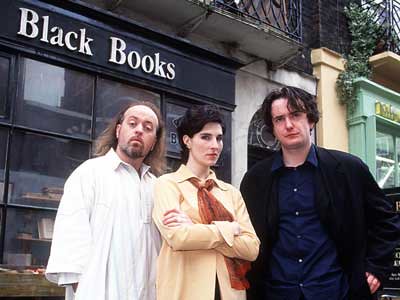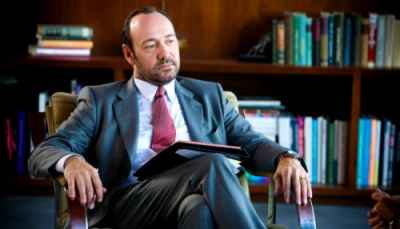
You can't watch a British comedy idly: Most require your full attention to make the best of their dry wit, and Black Books is no exception. About a reclusive bookstore owner who hates customers and cleanliness, but loves alcohol (openly) and the shop owner next door (secretly), Black Books manages masterfully with a central cast of just three characters: the aforementioned Bernard Black (Dylan Moran, series creator); the aforementioned suppressed loved interest, Fran (Tamsin Greig), and the Not Quite Right employee, Manny (Bill Bailey), who alternates between being very much together and altogether balmy. Having seen the series before, I greatly anticipated such comic escapades as The Night They Drank £7,000 of Wine and Thereafter Killed The Pope ("The Grapes of Wrath"), and... pretty much anything else in the season that involved severe liver abuse. Which, seeing as this is a British comedy, meant most of it.
#18. Shrink

Well, Spacey's back from K-PAX, that's for sure, but in what form? I never can tell with his films anymore. Nonetheless, from the get-go, Shrink defines itself clearly: This is a film where we start out with what should ostensibly feel like a dizzying number of seemingly unrelated story lines that will fuse together perfectly as time goes on. And it does! Hey! Who'd've thunk it. So from Kevin Spacey as a self-medicating celebrity psychiatrist grieving over his wife's suicide, to Robin Williams as a thinly veiled version of himself struggling with the desire for extramarital relations, to Dallas Roberts as an anal-retentive, obsessive-compulsive talent agent, to Mark Webber as a struggling screenwriter with a thing for Roberts' pregnant saint of an assistant, we're meant to be overwhelmed by the breadth of this film's reach and the depth of the issues it's addressing. But wait! I daresay we're still missing our catalyst in this whole, murky affair: young Jemma (Keke Palmer), whose deeply troubling case file is handed to Spacey by his character's father in a really unethical ploy to get Spacey past his wife's suicide. And yes, I know it's "really unethical" because my housemate's a psych grad, and for what it's worth she loved the movie for the hypothetical scenarios it allowed her to mull over in relation to her own work. As for me? The acting was decent, but the plot was far too pat. I was especially incensed by the cozy ending to a huge breach of ethics and betrayal of trust. These themes have been worked over before, elsewhere and better.
#19. World's Greatest Dad

I didn't intend to watch two back-to-back films with Robin Williams, but I can't say I minded. As a kid I watched Toys ad nauseum, and I've since always admired the breadth of roles he takes on. World's Greatest Dad belongs to a very particular role subset therein -- The Sad Man With A Smile -- and he plays it quite well here, as the middling private school teacher (Lance Clayton) with five unpublished novels and, as he later typifies it, a "douchebag" of a son. Sadly, this film reaches its zenith a third of the way through, when his son accidentally kills himself while masturbating and Lance enacts the perfect love of a father by providing a measure of dignity to the death. The trouble is, this action spirals out of hand -- going from a quiet familial moment to something that gives Lance the audience he always wanted, but at a price Lance ultimately can't bear. Oh, there were a lot of fun moments in this film, but a directorial conceit involving the school pool at the end (to push a metaphor down our throats) clinched my growing disillusionment with the script itself: Everything in this film happens because it needs to happen to fit the plot; but precious little of that follows sensibly from individual character motivations. How Lance's relationship develops with Claire (Alexie Gilmore) and ends, why he uses the precise words he does in his ultimate speech, the choices he makes with some of "his son's" writing, the way he treats his son's best friend, or his neighbour... a lot of little things make it clear Lance isn't really a character, but himself a plot device. Which is too bad, because again, the film's got a lot of fun moments. In the end, though, it tries to Mean Something -- and that's probably where it started to fall apart.
#20. The New Women

I was going to include this film in my upcoming LGBT-a-thon, but to my great surprise, this independent film from the LGBT section of our store really isn't LGBT at all. A really low-budget number about middle-aged women with run-of-the-mill marital/social problems, whose husbands all fall asleep one night and don't wake up, this film should have the makings for at least a silly romp into Bisexual-in-a-Pinch territory, but it doesn't even come close: All the women do is grumble about their husbands, with a few even mounting their comatose mates when they get desperate or lonely, and drive around the country looking for some semblance of civilization in the aftermath of males everywhere falling asleep. Yes, there are a couple intimations of bisexuality: A power-play by a vengeful woman run out of town after she slept with another woman's husband (she hijacks the latter woman's RV and forces this woman to dance for her -- a very brief humiliation that wouldn't even suffice for soft-core entertainment) and a couple lines from impressionable young women at a nearby women-only cult being tricked into thinking their leader is a god. Sorry, but if that's LGBT content, so too is prison rape. That aside, was the movie worth it? God no. For some reason the director thought shooting the whole thing in black-and-white would add a measure of classiness to it, but it doesn't work: For a more enjoyable look at this kind of post-apocalyptic scenario, do yourself a favour and read Y: The Last Man instead. There's even a movie coming out for it next year!
#21. The Book of Eli

I've had some time to put aside my crankiness about this film's blatant similarities to The Road: the post-apocalyptic desert, the male protagonist with a desperate need to get to the ocean, cannibals in waiting, and a quest involving the preservation of the Light. Denzel Washington plays Eli, a man from before The Flash (an event that eradicated most of civilization across North America), who's been traveling towards the sea for 30 years in possession of the last Bible. (The rest were burned after the war by people convinced that religion had caused this dystopic future in the first place.) Cue the tyrant of a small roadside community, Carnegie (Gary Oldman), who leads by threat of violence but is desperate to find a copy of the Bible, so that he might better prey upon the weak with that "weapon" too. Integral to the story is also Solara (Mila Kunis, in a perfect, transformative role from her famous performance as Jackie in That 70s Show), who gets Eli in hot water with her silly need to escape a life of rape and abject helplessness in Carnegie's city, but also redeems herself by helping him get to his final destination. It's a fun enough film, with all the samurai-esque fight scenes The Road will never in a million years provide, but with a very blatant message about the existence of god, miracles, and The Purpose God Has Laid Out For Those Of Faith. Personally, I've seen too much of the likes of Carnegie's spiritualism in the real world to think this film's approach to religion as anything but sugarcoated in the end. And a rip-off of The Road. Did I mention that? As a friend of mine declared yesterday, he's just about "plum tuckered out with charcoal'd films" (post-apocalyptic desert scenarios). Well, now so am I.
1 comment:
Wow, look at you on a roll!
Also, I love Black Books :D
Post a Comment